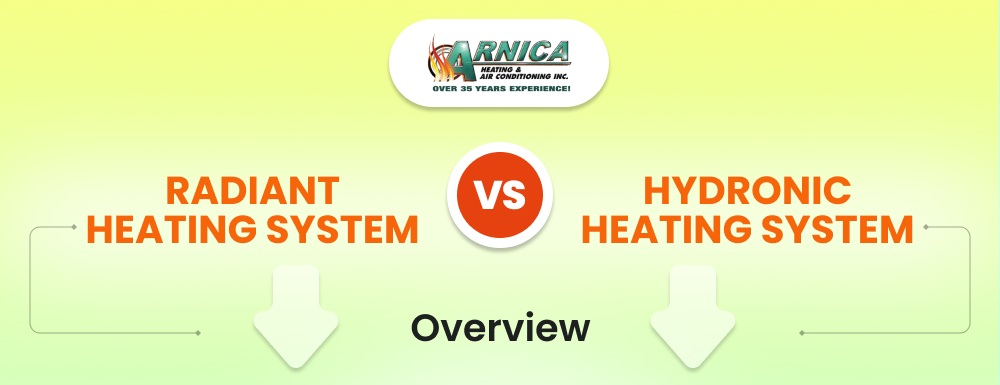
Radiant and hydronic heating system are two commonly utilized options for residential comfort. They differ somewhat, even though they have some things in common. Let us break out the key components to help you decide on a system for your property.
Radiant Heating System vs. Hydronic Heating System: A Comprehensive Comparison
Understanding Radiant and Hydronic Heating Systems
This system, hidden in the walls, ceiling, or floor, radiates heat from a network of tubes or wires buried there. Direct heat flow from the furnace to room objects and humans creates a pleasant and equal temperature.
Hydronic Heating – Hot water flowing through pipes heats your property. Hot water allows one to execute baseboard radiators or hydronic radiant heating floors.
Radiant Heating System—Foundations
Radiant heating offers several advantages.
- Radiant heat warms your space uniformly from the floor up, generating a pleasant and stable temperature.
- Radiant heating can be more energy efficient than traditional forced-air systems by heating objects straightforwardly.
- Since no ducts allow air to be moved, radiant heating helps lower allergies and dust particles.
- Design flexibility confines radiant heating in flooring, ceilings, or walls, providing versatility.
Installing radiant heating might cost more than more traditional systems. It can also require flooring or structural alterations to your present setup.
Fundamentals of Hydronic Heating System
The advantages of hydronic heating systems follow:
- Hydronic systems can be pretty efficient, especially when combined with high-efficiency boilers.
- Versatility: Just as radiant heating can be used with numerous heat distribution methods, hydronic systems can be used with radiant floor, baseboard radiators, or fan coil units.
- Usually running silently, hydronic systems free up forced-air systems of noise.
- Long Lifetime: With proper maintenance, hydronic systems might last decades.
The disadvantage of hydronic heating, especially for larger homes, is the probable more significant installation costs than forced-air systems. It also demands periodic maintenance on boiler and pipe systems.
Which Heating System Will Work for You?
Choosing either radiant or hydronic heating depends on several factors:
- Budget: Consider first running costs and installation fees of any system.
- Home Size and Layout: The layout and size of your property could affect the best heating source.
- Climate: Your local climate will determine the effectiveness some heating systems.
- Current Infrastructure: Upgrading the radiant floor might be wise even if you currently have a hydronic system in place.
- Personal Preference: At last, the best one suits your comfort and way of life. Call out experts for heating installation in Queens.
Professional Heating System Installation in Queens and Brooklyn
If you are considering radiant or hydronic heating for your Brooklyn or Queens residence, you need advice from a qualified professional for installation. Reputable heating companies can assess your needs and offer the best heating installation in Brooklyn.
Working with a qualified professional and attentively evaluating your options will enable you to appreciate the efficiency and comfort of radiant or hydronic heating in your home.


Over 35 years of experienced HVAC engineer and blogger with years of experience writing about various topics related to multiple types of HVAC systems installation, repair, and maintenance. I have been in this industry since my apprenticeship in 1985. Our team emphasizes quality workmanship while ensuring customer satisfaction is our top priority.




Leave a Reply
You must be logged in to post a comment.